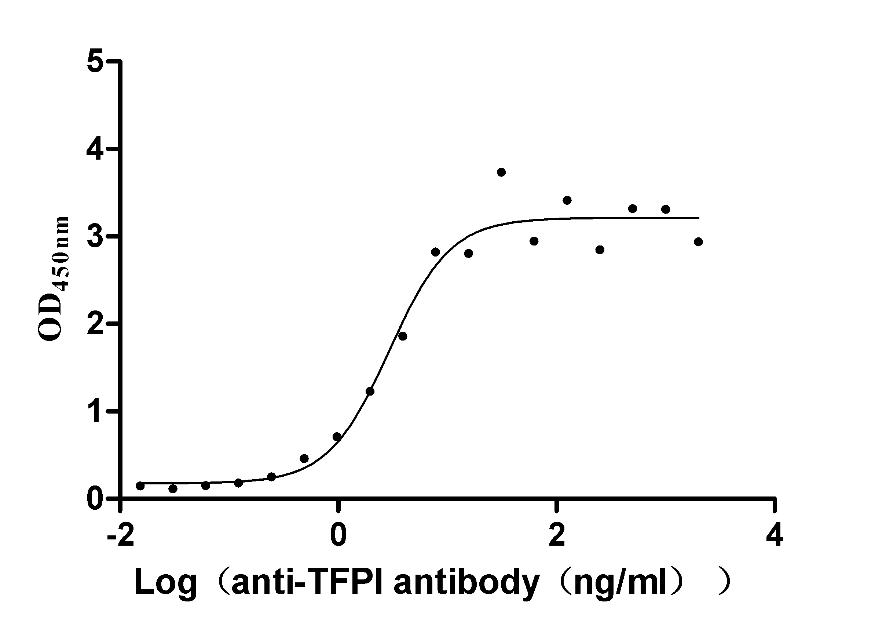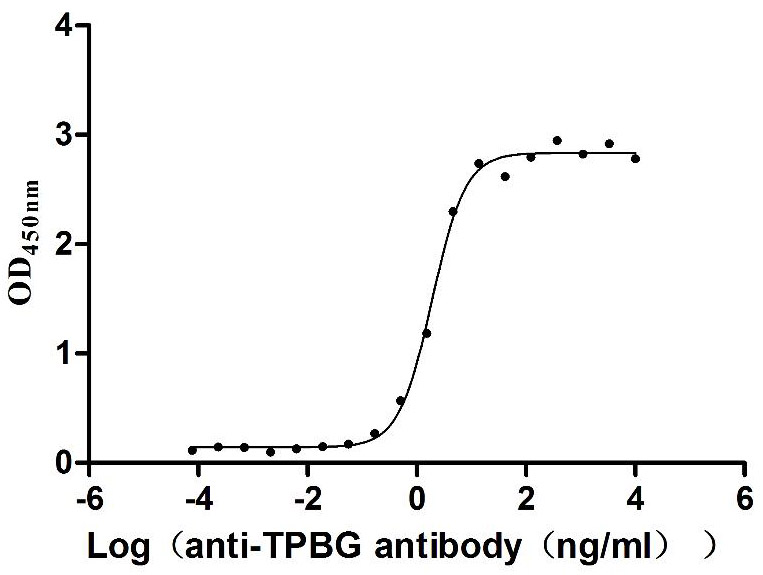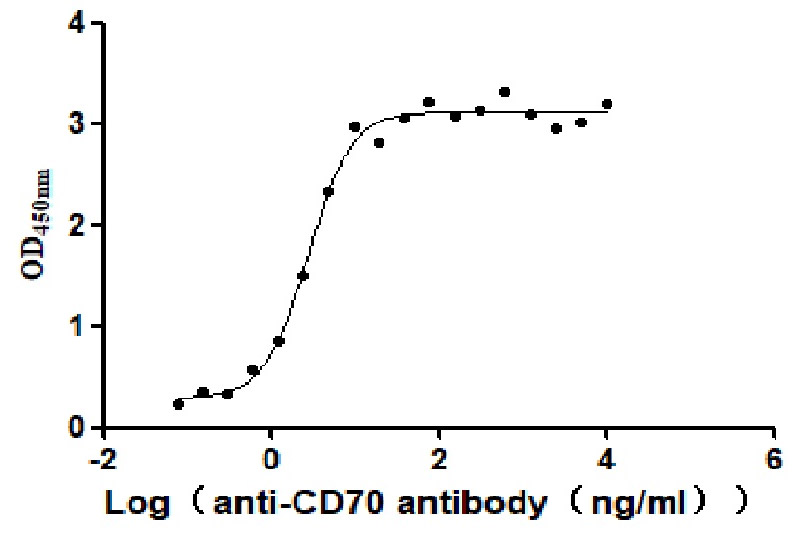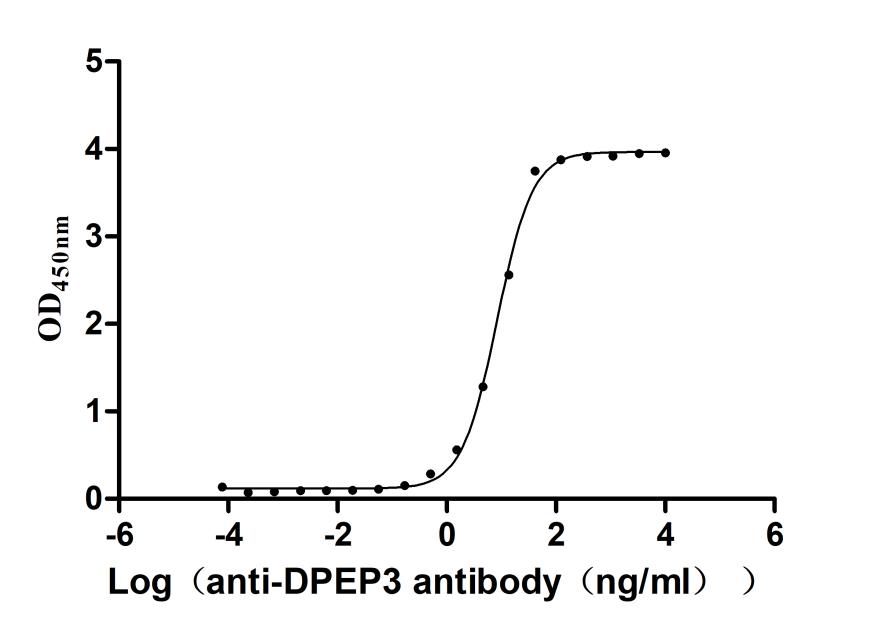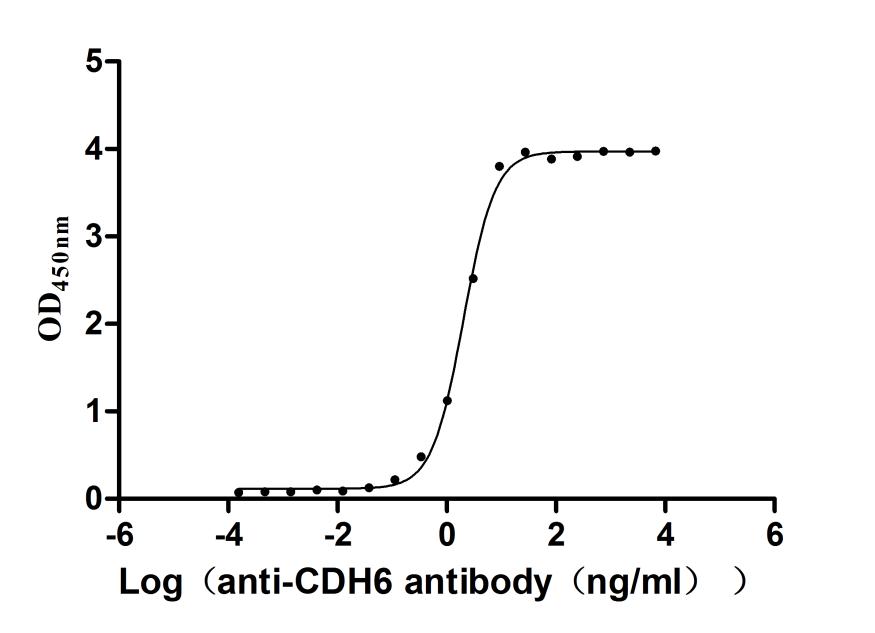Recombinant Human Protein S100-A2 (S100A2)
-
货号:CSB-YP020630HU
-
规格:
-
来源:Yeast
-
其他:
-
货号:CSB-EP020630HU
-
规格:
-
来源:E.coli
-
其他:
-
货号:CSB-EP020630HU-B
-
规格:
-
来源:E.coli
-
共轭:Avi-tag Biotinylated
E. coli biotin ligase (BirA) is highly specific in covalently attaching biotin to the 15 amino acid AviTag peptide. This recombinant protein was biotinylated in vivo by AviTag-BirA technology, which method is BriA catalyzes amide linkage between the biotin and the specific lysine of the AviTag.
-
其他:
-
货号:CSB-BP020630HU
-
规格:
-
来源:Baculovirus
-
其他:
-
货号:CSB-MP020630HU
-
规格:
-
来源:Mammalian cell
-
其他:
产品详情
-
纯度:>85% (SDS-PAGE)
-
基因名:S100A2
-
Uniprot No.:
-
别名:CAN19; MGC111539; Protein S 100L; Protein S-100L; Protein S100 A2; Protein S100-A2; Protein S100L; S100 A2; S100 calcium binding protein A2; S100 calcium-binding protein A2; S100A2; S100L; S10A2_HUMAN
-
种属:Homo sapiens (Human)
-
蛋白长度:Full length protein
-
表达区域:1-98
-
氨基酸序列MMCSSLEQAL AVLVTTFHKY SCQEGDKFKL SKGEMKELLH KELPSFVGEK VDEEGLKKLM GSLDENSDQQ VDFQEYAVFL ALITVMCNDF FQGCPDRP
-
蛋白标签:Tag type will be determined during the manufacturing process.
The tag type will be determined during production process. If you have specified tag type, please tell us and we will develop the specified tag preferentially. -
产品提供形式:Lyophilized powder
Note: We will preferentially ship the format that we have in stock, however, if you have any special requirement for the format, please remark your requirement when placing the order, we will prepare according to your demand. -
复溶:We recommend that this vial be briefly centrifuged prior to opening to bring the contents to the bottom. Please reconstitute protein in deionized sterile water to a concentration of 0.1-1.0 mg/mL.We recommend to add 5-50% of glycerol (final concentration) and aliquot for long-term storage at -20℃/-80℃. Our default final concentration of glycerol is 50%. Customers could use it as reference.
-
储存条件:Store at -20°C/-80°C upon receipt, aliquoting is necessary for mutiple use. Avoid repeated freeze-thaw cycles.
-
保质期:The shelf life is related to many factors, storage state, buffer ingredients, storage temperature and the stability of the protein itself.
Generally, the shelf life of liquid form is 6 months at -20°C/-80°C. The shelf life of lyophilized form is 12 months at -20°C/-80°C. -
货期:Delivery time may differ from different purchasing way or location, please kindly consult your local distributors for specific delivery time.Note: All of our proteins are default shipped with normal blue ice packs, if you request to ship with dry ice, please communicate with us in advance and extra fees will be charged.
-
注意事项:Repeated freezing and thawing is not recommended. Store working aliquots at 4°C for up to one week.
-
Datasheet :Please contact us to get it.
相关产品
靶点详情
-
功能:May function as calcium sensor and modulator, contributing to cellular calcium signaling. May function by interacting with other proteins, such as TPR-containing proteins, and indirectly play a role in many physiological processes. May also play a role in suppressing tumor cell growth.
-
基因功能参考文献:
- S100A2 and S100P can be used as specific duct markers in eccrine sweat glands, and combined use of S100P or S100A2 with keratins enables easy to distinction between secretory coils and ducts. PMID: 28353163
- These results indicate that oxidative stress impairs the ability of S100 proteins to bind and activate PP5, which in turn modulates the ASK1-mediated signaling cascades involved in apoptosis. PMID: 27600583
- high S100A2 expression and NSCLC PMID: 27876462
- Our results indicate that serum levels of S100A2 and S100A6 are significantly elevated in early stage non-small cell lung cancer PMID: 26361956
- S100A2 could have a role in poor prognosis in stage II and III colorectal cancer recurrence PMID: 26783118
- The potential of cytoplasmic S100A2 overexpression as a predictor of recurrence risk in oral squamous cell carcinoma patients. PMID: 25591983
- Data show higher expression level of S100A2 in high-invasive cholangiocarcinoma Cell Line suggesting it as potential marker of tumor progression and novel therapeutic target. PMID: 25999659
- Our investigation complements the current understanding of laryngeal cancer progression. Furthermore, this study supports the concept that enhanced expression of S100A2 may be a promising strategy in developing novel cancer therapeutic drugs. PMID: 25874882
- These data demonstrate the importance of S100A2 downstream of the BRCA1/DeltaNp63 signalling axis in modulating transcriptional responses and enforcing growth control mechanisms through destabilisation of mutant p53. PMID: 24556685
- loss of S100A2 expression contributes to Ggastric cancer development and progression. PMID: 24318973
- S100A2 protumorigenic actions and its involvement in TGF-beta-mediated cancer cell invasion and epithelial-mesenchymal transition. PMID: 23996929
- Expression of S100A2 in cholangiocarcinoma cells significantly correlated with the histological grade, lymph node metastasis, clinical stage, and a poor survival rate of the patients. Thus it is a strong tumor marker for the cancer. PMID: 23621473
- Data indicate that S100A2 expression predicts longer disease-free survival (DFS) and overall survival (OS) in patients treated with adjuvant therapy and should be evaluated as a predictive biomarker. PMID: 23726265
- In conclusion, data from the present study demonstrated that loss of S100A2 expression contributes to gastric cancer development and progression PMID: 23337980
- Data indicate S100A2 and S100P proteins as novel Ca2+-dependent regulators of the CHIP-proteasome pathway. PMID: 23344957
- findings highlight an important link between the TGF-beta1-induced MAPK and p53 signalling pathways in the regulation of S100A2 expression and pro-tumorigenic actions PMID: 22747445
- Loss of Reprimo and S100A2 expressions occurs frequently in gastric adenocarcinomas. The expressions of Reprimo and S100A2 may be potential biomarkers for gastric adenocarcinomas detection. PMID: 20949468
- The coding sequence polymorphism S100A2_185G>A had no regulatory role in S100A2-mediated tumor suppression in oral cancer. PMID: 21029261
- S100A2 is upregulated in gastric adenocarcinoma and is associated with tumor progression. PMID: 21443102
- Although the diffraction data of S100A2 were recorded at a wavelength of 0.90 A, which is usually not assumed to be suitable for calcium/sulfur SAD, the anomalous signal was satisfactory. PMID: 20823519
- decrease in S100A2 staining from normal to cancer cases is more pronounced in glandular than in squamous epithelial tissue PMID: 11813862
- Expression of S100A2 protein in squamous cell carcinoma of the esophagus PMID: 11956617
- DeltaNp63 transactivated the S100A2 promoter, and significantly more fold changes were seen in DeltaNp63-introduced cells than in p53-introduced cells, suggesting that DeltaNp63 may be a novel stimulator of the S100A2 promoter. PMID: 14519656
- Strong S100A2 expression was often associated with increasing levels of disorder in preinvasive bronchial lesions in non-small cell lung cancer. PMID: 15467767
- in oral cancer cells the Ca(2+)- and cell cycle-dependent p53-S100A2 interaction might modulate proliferation PMID: 15941720
- The five genes, and three of the encoded proteins, were shown differentially expressed between a group of keratoconus patients and a reference group using different techniques PMID: 16015083
- abnormal transcription of TACSTD2 and S100A2 are thought to be unique molecular markers of the preinvasive stage of lung adenocarcinoma PMID: 16232198
- S100A2 expression was demonstrated to be the only independent factor for late cervical metastasis. PMID: 16273244
- Involvement of S100A2 and S100A4 in the progression of lung adenocarcinomas provides a list of targets regulated by S100A2 and S100A4. PMID: 16367903
- S100A2 gene, whose transcript and protein are induced during keratinocyte differentiation, is a direct transcriptional target of p73beta and DeltaNp63alpha and is required for proper keratinocyte differentiation PMID: 16449968
- results demonstrate frequent cytosolic overexpression of S100A2 and S100A4 in Barrett's adenocarcinoma PMID: 17032501
- Increased S100 A2 expression is associated with non-small cell lung cancer PMID: 17067748
- Preliminary analysis of the X-ray data indicates that there are two subunits per asymmetric unit. PMID: 17077493
- S100A2 was down-regulated in lymph node metastasis of squamous cell carcinoma, head and neck neoplasms (SCCHN), suggesting that instead of being a putative tumor suppressor, S100A2 may play a role in the metastasis of SCCHN PMID: 17123307
- Zn2+ might deactivate S100A2 by inhibiting response to intracellular Ca2+ signals PMID: 17239974
- STMN1, but not SYK or S100A2, have roles in preventing progression of ER-positive primary breast cancer PMID: 17874182
- Gene regulation is mediated by a novel transcriptional element in the S100A2 promoter which is bound by TAp63gamma but not by p53. PMID: 18388131
- Analysis of S100A2 expression revealed that expression in adenocarcinomas and squamous cell carcinomas is significantly different, but not related to any of the found alterations. PMID: 18656279
- S100A2 and S100A6 interact with another TPR protein Tom70 and regulate the Tom70-ligand interaction in vitro PMID: 18669640
- Survival after UVA irradiation was greater in human keratinocytes compared to mouse skin with no S100A2 expression, showing a protective role for S100A2. A S100A2-dependent difference was observed in the induction of Cxcl13 transcripts in transgenic mice. PMID: 18773213
- These findings identify S100A2 as a strong metastasis inducer in vivo. PMID: 19118029
- Diminished expression of S100A2, a putative tumor suppressor, is an independent predictive factor of neck node relapse in laryngeal squamous cell carcinoma. PMID: 19344608
- S100A2 expression is a good predictor of response to pancreatectomy for Pancreatic Cancer and suggests that high S100A2 expression may be a marker of a metastatic phenotype. PMID: 19376121
- S100A2 and p63 protein both play important roles in the carcinogenesis of esophageal squamous cell carcinoma (ESCC). An investigation into the combined expression of S100A2 and p63 may be helpful in early diagnosis. PMID: 19725154
收起更多
-
蛋白家族:S-100 family
-
组织特异性:A subset of epithelial cells including normal human mammary epithelial cells and keratinocytes.
-
数据库链接:
HGNC: 10492
OMIM: 176993
KEGG: hsa:6273
STRING: 9606.ENSP00000357697
UniGene: Hs.516484


